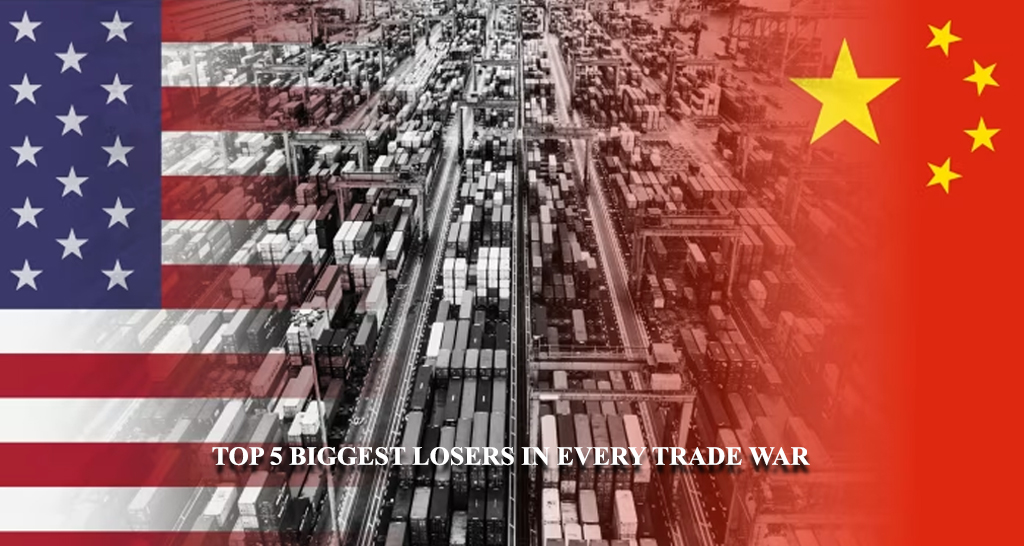Trade wars have historically served as a mechanism of economic policy, frequently employed to safeguard local industries, or respond to unjust practices. Nevertheless, the repercussions are seldom limited to the nations directly involved. This article examines the five most notable victims of some of the most impactful trade wars in history.
- US-China Trade War (2018–2020)
Biggest Losers:
American Farmers: The tariffs imposed on Chinese products led China to retaliate with its own tariffs on U.S. agricultural exports, severely impacting soybean, pork, and dairy farmers.
Chinese Manufacturing: The core of China’s economy encountered interruptions in supply chains and a decline in demand from American consumers.
Global Supply Chains: Businesses that depend on international production encountered increased expenses and logistical challenges.
U.S. Consumers: Increased tariffs on products from China resulted in higher costs for common goods such as electronics, apparel, and furniture.
Tech Industry: U.S. technology companies reliant on Chinese manufacturing and market entry, including Apple, experienced operational challenges.
- US-EU Steel and Aluminum Tariffs (2018)
Biggest Losers:
European Steel and Aluminum Industries: Confronted with limited access to U.S. markets, these sectors experienced challenges due to overproduction and declining prices.
U.S. Manufacturers: Industries dependent on steel and aluminum, such as the automotive and construction sectors, experienced a dramatic increase in costs.
Global Trade Partners: Countries such as Canada and Mexico, which were also affected by U.S. tariffs, faced interruptions in trade.
American Consumers: Increased prices for products reliant on steel have affected the expenses associated with construction and home improvement.
International Relations: Diplomatic strains have put a strain on transatlantic relations, impacting wider economic collaboration.
- Smoot-Hawley Tariff Act (1930)
Biggest Losers:
Global Economy: This protectionist policy resulted in retaliatory tariffs across the globe, exacerbating the Great Depression.
U.S. Exporters: American exports in agriculture and industry saw a significant decline as international markets shut down.
Global Trade Partners: Countries such as Canada and the United Kingdom experienced notable reductions in their export volumes to the United States.
U.S. Consumers: The increase in prices for goods can be attributed to diminished competition and elevated import expenses.
U.S. Farmers: Farmers reliant on exports experienced a significant decline in prices and a reduction in their income.
- US-Japan Trade War (1980s–1990s)
Biggest Losers:
Japanese Automakers: Japanese companies, such as Toyota, faced significant challenges in their early years despite being initially targeted; however, they managed to adapt over time.
U.S. Auto Industry: Protectionist policies resulted in inefficiencies and increased expenses within the U.S. manufacturing sector.
Global Technology Sector: U.S. technology firms encountered difficulties in competing against Japanese advancements.
American Consumers: The costs of Japanese automobiles and electronic devices have risen because of tariffs.
- US-Russia Trade Sanctions (2014–Present)
Biggest Losers:
Russian Economy: Sanctions focused on critical sectors such as energy, finance, and agriculture, hindering economic growth.
Western Companies: ExxonMobil and similar companies experienced financial setbacks because of limited activities in Russia.
Global Energy Market: Disruptions in the flow of oil and gas have impacted global pricing and supply chains.
Russian Consumers: Inflation and limited availability of Western products have led to a decline in living standards.
European Economies: Nations with close connections to Russia, such as Germany, felt the economic repercussions.
Conclusion
Trade wars frequently begin with calculated objectives but can quickly escalate into economic turmoil, impacting various industries, consumers, and diplomatic relations. Although certain countries might achieve short-term protection for their industries, the global economy seldom gains from extended disputes. Historical evidence indicates that open markets and collaborative efforts generally lead to the most successful outcomes.










